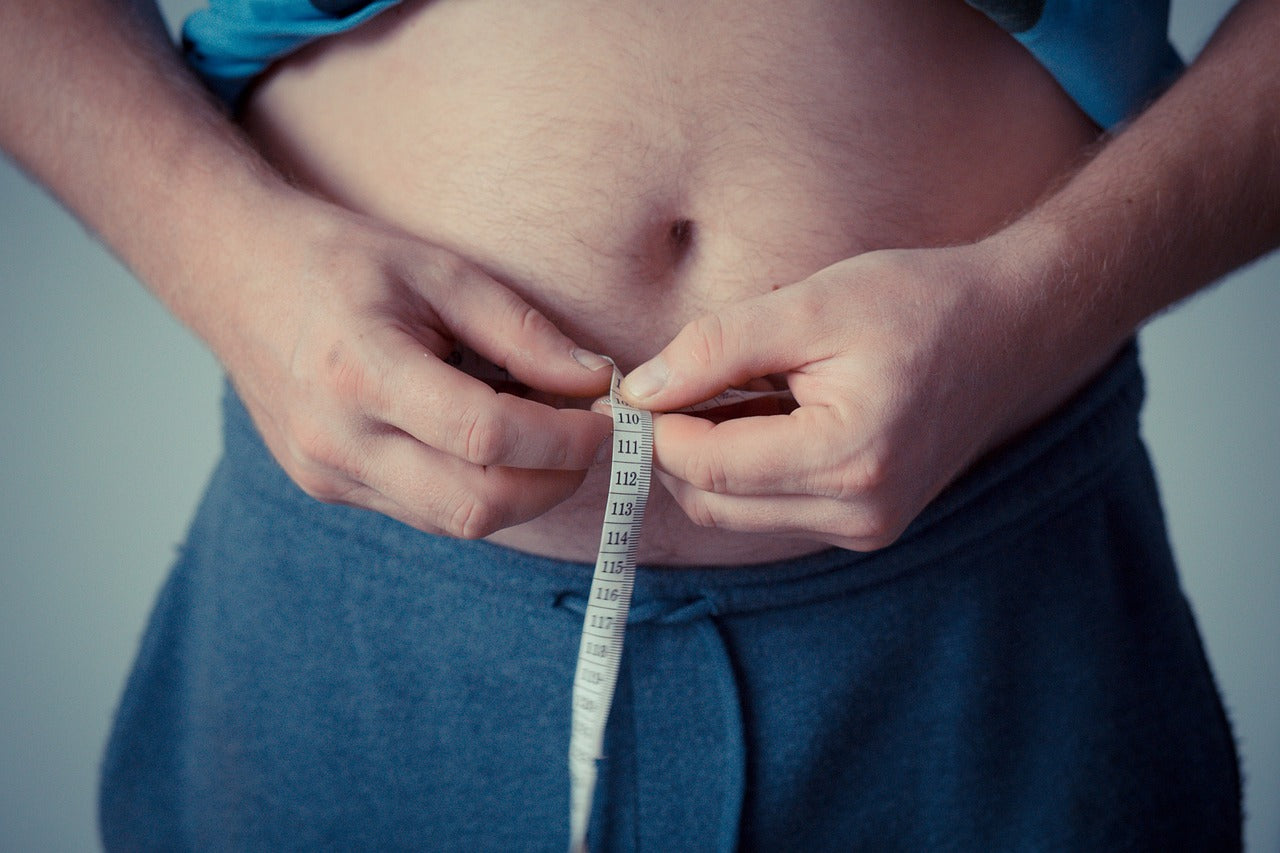Are you experiencing weight gain during menopause? Read this article!
Menopause is an inevitable stage in every woman's life , but it often brings with it a series of physical and mental changes. One of the most common problems during menopause is weight gain . Many women find themselves struggling with the difficulty of maintaining a healthy and constant weight during this stage of their lives.
In this article, we will explore the main reasons behind weight gain during menopause. Understanding these reasons can help women make informed decisions and adopt effective strategies to manage their weight.
With a DNA test you can get advice on a personalized diet that is optimized for your current situation.
Menopause and Weight Gain
During menopause, a woman's body goes through a series of significant changes. Menopause is the time when a woman stops having menstrual periods and marks the end of her ability to conceive. This stage can occur between the ages of 45 and 55, although it can vary from woman to woman.
During menopause, significant hormonal changes occur in a woman's body. In particular, there is a decrease in estrogen, the hormone responsible for regulating the menstrual cycle and maintaining a number of bodily functions. This decrease in estrogen can have a significant impact on metabolism and fat distribution in the body.
Weight gain during menopause can be attributed to several factors, including hormonal changes. Estrogen helps maintain an active metabolism and a more balanced distribution of fat. As estrogen decreases, the metabolism may slow down and the body may tend to store more fat, especially in the abdominal area.
In addition to hormonal changes, menopause can also lead to changes in physical activity levels. Many women may experience decreased energy and increased fatigue during this phase. This can affect the amount of physical activity they get, contributing to weight gain.
Additionally, menopause can be a time of emotional and physical stress. This stress can lead to an increased tendency to emotionally eat or make less healthy food choices, contributing to weight gain.
Understanding the basics of menopause and weight gain is essential to addressing this challenge effectively. In the remainder of this article, we will explore the specific reasons for weight gain during menopause and provide tips on how to manage this situation.
Reason 1: Hormonal Changes
During menopause, hormonal changes are a major reason for weight gain. Hormones play a major role in regulating metabolism, appetite, and fat distribution in the body. During menopause, a decrease in estrogen can affect these processes, leading to weight gain.
Why Hormones Cause Weight Gain
Estrogens are the female sex hormones responsible for regulating the menstrual cycle and maintaining a variety of bodily functions. They affect metabolism, stimulating energy production and fat burning. During menopause, when estrogen levels decline, metabolism can slow down, reducing the body's ability to burn calories efficiently.
Additionally, decreased estrogen can affect the distribution of fat in the body . During menopause, many women notice an increase in body fat in the abdominal area. This is due to decreased estrogen, which can promote the accumulation of visceral fat, the type of fat that is stored around internal organs. Visceral fat is associated with a higher risk of heart disease and diabetes.
The Hormones Involved
In addition to estrogen, other hormones can influence weight gain during menopause. One of them is progesterone , another female hormone that plays a role in regulating the menstrual cycle. During menopause, progesterone levels decrease along with estrogen. This can affect the balance of hormones in the body and contribute to weight gain.
Another hormone involved in weight gain during menopause is insulin . Insulin is responsible for regulating blood sugar levels. During menopause, insulin resistance may increase, meaning the body has difficulty using insulin efficiently. This can lead to fat storage and the risk of developing diabetes.
How to Manage Hormonal Changes
While hormonal changes during menopause may be unavoidable, there are ways to manage them to minimize weight gain. Here are some helpful tips:
-
Balanced Diet: Eating a healthy, balanced diet can help you maintain a stable weight during menopause. Make sure you eat a variety of nutritious foods, including fruits, vegetables, whole grains, lean proteins, and healthy fats.
-
Regular physical activity: Regular exercise can help keep your metabolism active and burn extra calories. Choose activities that you enjoy, such as walking, yoga, swimming, or dancing, and try to get at least 30 minutes of exercise a day.
-
Maintain a healthy weight: Maintaining a healthy weight can help manage hormonal changes during menopause. If necessary, consult a healthcare professional to develop a safe and effective weight loss plan.
-
Stress Management: Stress can affect your hormones and your weight. Finding healthy ways to manage stress, such as practicing meditation, yoga, or the art of deep breathing, can help you maintain optimal hormonal balance.
Understanding and managing hormonal changes during menopause is essential to effectively addressing weight gain. Implementing these strategies can help you maintain a healthy weight and improve your overall well-being during this stage of life.
Reason 2: Reduced Metabolism
During menopause, another reason for weight gain is a decreased metabolism. Metabolism is the process by which the body converts food into energy. During menopause, metabolism can slow down, making it harder for the body to burn calories efficiently.
How Metabolism Affects Weight Gain
Metabolism is responsible for regulating the amount of calories your body burns. When your metabolism is fast, your body burns more calories, even at rest. This is especially beneficial for maintaining a healthy weight. However, during menopause, your metabolism can slow down , reducing the number of calories your body burns.
A slower metabolism means your body burns fewer calories to perform the same daily activities. This can lead to excess calories being stored, which results in weight gain. A slower metabolism can also make it harder to lose weight or keep it off once you have achieved it.
Why Metabolism Decrease
There are several factors that can contribute to the reduction of metabolism during menopause. One of these is the decrease in estrogen, as discussed in the previous section.
Additionally, as we age, our metabolism naturally tends to decrease. This is due to a decrease in muscle mass and an increase in fat tissue. Muscle mass burns more calories than fat tissue, so a decrease in muscle mass can affect our metabolism.
Additionally, a sedentary lifestyle can contribute to a slower metabolism . Low levels of physical activity can lead to a reduction in muscle mass and a slower metabolism. During menopause, many women may experience decreased energy and increased fatigue, which can lead to a decrease in physical activity.
How to Increase Metabolism
While it may seem inevitable that your metabolism will slow down during menopause, there are ways to increase it and offset the weight gain. Here are some tips to boost your metabolism:
-
Regular Exercise: Exercise is an effective way to boost your metabolism. Choose activities that involve both cardiovascular training and weight lifting. Cardiovascular training helps burn calories during activity, while weight lifting helps build muscle mass, which burns calories even at rest.
-
Proper nutrition: A balanced and energy-rich diet can help support a healthy metabolism. Make sure you consume enough calories to support energy and physical activity, but not too much. Also include protein-rich foods to support the growth and maintenance of muscle mass.
-
Drink enough water: Proper hydration is important for your metabolism. Drinking enough water can help keep your metabolism running efficiently and promote fat burning.
-
Sleep Well: Quality sleep is essential for a healthy metabolism. Make sure you get adequate, quality sleep to support your metabolism and overall well-being.
-
Stress Management: Chronic stress can affect your metabolism. Finding healthy ways to manage stress, such as meditation, exercise, or therapy, can help maintain a healthy metabolism.
Boosting your metabolism during menopause can help you manage weight gain and maintain a healthy weight. Implementing these strategies can make a difference in weight management during this stage of life.
With a DNA test you can get advice on a personalized diet optimized for your current situation.
Reason 3: Lifestyle Changes
During menopause, lifestyle changes can be a significant driver of weight gain. Menopause often brings with it a series of challenges and changes that can affect body weight. Understanding how lifestyle can influence weight gain during menopause is essential to adopting the right management strategies.
How Lifestyle Affects Weight Gain
Lifestyle plays a crucial role in weight management during menopause. A number of factors can influence weight gain during this stage of life:
-
Lack of physical activity: During menopause, many women may experience decreased energy and increased fatigue. This can lead to decreased physical activity, which can affect weight gain. A lack of physical activity can slow down your metabolism and reduce muscle mass, making it harder to burn excess calories.
-
Poorly Balanced Diet: Poorly balanced diets can contribute to weight gain during menopause. Often, women may find comfort in foods that are high in sugar or fat, which can lead to excessive calorie consumption. Additionally, a lack of essential nutrients in the diet can affect overall health and metabolism.
-
Emotional Eating: During menopause, many women may experience mood swings and emotional distress. This can lead to increased food consumption as a coping mechanism, known as emotional eating. Emotional eating may be associated with increased unhealthy food intake and weight gain.
Reason 4: Associated Health Problems
During menopause, health problems can be a reason for weight gain. Some medical conditions associated with menopause can affect your body weight and make weight management more difficult. Understanding these health problems and how to address them is essential to effectively managing weight gain during menopause.
What Health Problems Can Cause Weight Gain?
During menopause, some women may experience health problems that can contribute to weight gain:
-
Hypothyroidism : Hypothyroidism is a condition in which the thyroid gland does not produce enough thyroid hormones. This can slow down your metabolism and lead to weight gain. Other symptoms of hypothyroidism include fatigue, feeling cold, dry skin, and brittle hair. If you suspect you may have hypothyroidism, it is important to see a doctor for proper evaluation and treatment.
-
Diabetes : Diabetes is a condition in which the body has difficulty regulating blood sugar levels. During menopause, insulin resistance may increase, which can lead to high blood sugar and fat accumulation. Diabetes can affect body weight and require appropriate management through diet, exercise, and sometimes medications.
-
Mood disorders : During menopause, many women may experience mood swings, anxiety, or depression. These disorders can affect overall health and eating behavior. Some people may turn to food as a coping mechanism to manage these conditions, which can lead to weight gain.
-
Disturbed Sleep: During menopause, many women may experience sleep disturbances such as insomnia or hot flashes at night. Lack of quality sleep can affect metabolism and eating habits, leading to weight gain.
Menopause is a transitional period in a woman's life, but it doesn't have to be an insurmountable obstacle to maintaining a healthy weight. With the right awareness, information, and action, it is possible to manage weight gain during menopause and maintain optimal overall well-being.
With a DNA test you can get advice on a personalized diet optimized for your current situation.




Leave a comment
This site is protected by hCaptcha and the hCaptcha Privacy Policy and Terms of Service apply.